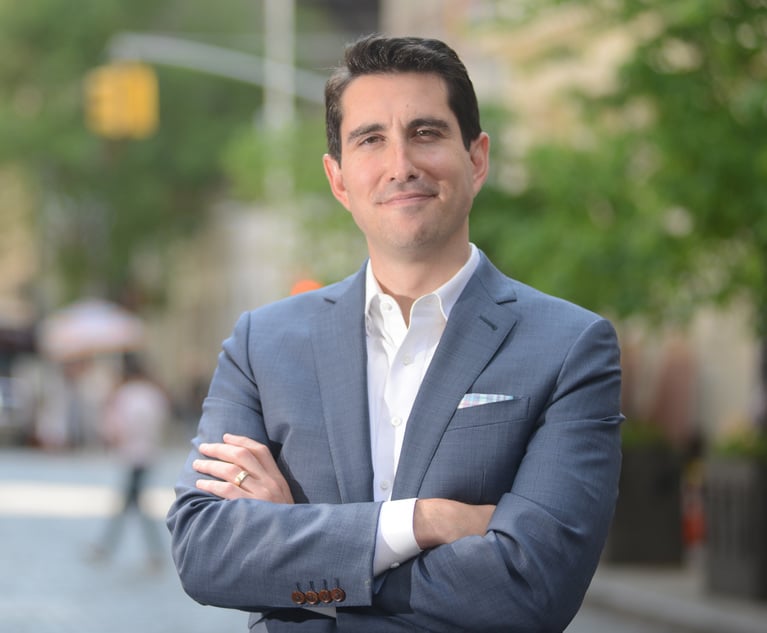California Court Claims Jurisdiction Over Interstate Internet Shadiness
In a ruling sure to be invoked in social media-heavy disputes that involve parties across state borders, a Michigan resident lost out on a bid to persuade the California Court of Appeal that he shouldn't face claims in the state's courts over fabricated direct messages and text conversations.
February 21, 2020 at 04:57 PM
5 minute read
 Photo: Tero Vesalainen/Shutterstock.com
Photo: Tero Vesalainen/Shutterstock.com
An out-of-state defendant has failed to persuade a California appellate court that he shouldn't be hauled into the state's courts to face claims that he sent anonymous social media messages and fabricated direct messages and text conversations in attempts to undermine a distant relative's relationship.
The Fourth District Court of Appeal on Thursday found that California courts had specific personal jurisdiction over Michigan resident Yousef Zehia, who denied making allegedly defamatory statements about Nicholas Nadhir, a California resident who had been arranged to meet Zehia's relative.
Writing for a unanimous three-judge panel, Fourth District Presiding Justice Judith McConnell noted that though Zehia denied using the social media accounts or creating the fake conversations at the heart of the case, the trial court had made findings based on "substantial evidence" that there was a likelihood that Zehia had used social media accounts in the manner described in the complaint. The appellate court, McConnel noted, was bound by the trial court's finding for purposes of the appeal.
"By sending California-focused messages and conversations directly to California residents for the alleged purpose of interfering with the relationship of California residents and causing reputational injury in California, Zehia has 'purposefully "reach[ed] out beyond" [his s]tate and into' California,'" wrote McConnell, citing Walden v. Fiore, a 2014 decision from the U.S. Supreme Court governing when state courts may exercise jurisdiction over nonresident defendants.
Zehia's lawyer, Lee Sherman of Callahan Thompson Sherman & Caudill, was out of the office and unavailable for comment Friday.
The underlying complaint has a distinctly 21st-century feel, and the ruling is sure to be invoked in further social media-heavy disputes that involve parties across state borders. Nadhir initially sued unnamed doe defendants in July 2018 for defamation, violation of the online impersonation law, appropriation of name or likeness, and intentional infliction of emotional distress after a family-arranged introduction at church with Zehia's distant relative, referred to in court filings as S.M.
According to the appellate opinion, S.M. had never met Nadhir and believed Zehia may be familiar with him, and she therefore asked her relative for information about her arranged suitor.
Shortly thereafter, Nadhir reported receiving social media direct messages sent from usernames he did not recognize, including a friend request from one named "[S.M.]does.not.want.this." Another sent from "nick.check.your.dm.request" read: "[S.M.] is finding this whole thing very stressful and as an invasion of privacy, she is not happy and is being pressured by her family. Best thing is to just let this whole thing go and everyone move on. Tell the moms and aunts to just drop the whole thing. She is finding this to be very unnatural."
In the following weeks, Zehia told S.M. he was in social media contact with an anonymous user familiar with Nadhir who warned him that S.M. was "walking into a trap" and that Nadhir viewed her "as a piece of meat." Zehia claimed the anonymous user forwarded him direct message and text conversations with Nadhir where he purportedly made sexually explicit statements about S.M. and derogatory statements about her family. Zehia sent S.M. screenshots of his conversations with the anonymous user and the anonymous users' alleged conversations with Nadhir.
Nadhir denied making the statements and after filing the initial suit against the Doe defendants conducted discovery which he claimed pointed to Zehia's involvement in the creation of the social media accounts at issue and fabricating the disparaging conversations. Nadhir amended his complaint to name Zehia in January 2019.
Zehia lawyers filed a motion to quash claiming their client didn't make any of the defamatory comments or fabricate digital conversations. But they further argued that even had Zehia engaged in the underlying conduct, the harmful online statements about Nadhir weren't made with knowledge he would suffer harm in California.
In Thursday's order, the Fourth District found the alleged conduct in the case involved "private social media messages aimed exclusively at a California audience." The court held that "this conduct formed the necessary connection between Zehia and California to warrant the exercise of specific personal jurisdiction" and that it differed from other cases involving social media posts directed to less specific audiences where courts have not found jurisdiction.
Nadhir's appellate lawyer, Marisa Janine-Page of Caldarelli Hejmanowski Page & Leer, said in a phone interview Friday that she felt like she faced an uphill battle at the Court of Appeal since the court had issued an order to show cause why Zehia's request for relief should not be granted. She said that she was prepared to discuss more than 30 cases involving social media going into oral argument, but that there weren't any cases completely on point going her client's way. But she added that her client's case presented cyber-bullying targeted into the state at Californians, giving the defendant's actions the "quality and nature" requiring him to submit to jurisdiction in California.
This content has been archived. It is available through our partners, LexisNexis® and Bloomberg Law.
To view this content, please continue to their sites.
Not a Lexis Subscriber?
Subscribe Now
Not a Bloomberg Law Subscriber?
Subscribe Now
NOT FOR REPRINT
© 2025 ALM Global, LLC, All Rights Reserved. Request academic re-use from www.copyright.com. All other uses, submit a request to [email protected]. For more information visit Asset & Logo Licensing.
You Might Like
View All
Kraken’s Chief Legal Officer Exits, Eyes Role in Trump Administration
3 minute read
‘Facebook’s Descent Into Toxic Masculinity’ Prompts Stanford Professor to Drop Meta as Client
6 minute read
Miami Judge Approves Shaq's $11 Million Settlement to Resolve Astrals Investor Claims
3 minute read
Crypto Exchange’s ‘Meteoric Rise’ Leads to Nationwide Class Action Trend
4 minute readTrending Stories
- 1DC Bar’s Proposed Anti-Discrimination, Harassment Conduct Rule Sees More Pushback
- 2California's Chief Justice Starts Third Year With Questions About Fires, Trump and AI
- 3Justin Baldoni Sues Blake Lively and Ryan Reynolds for $400M in New Step in 'It Ends With Us' Fight
- 4Top Leadership Changes Coming for NJ Attorney General's Office
- 5SCOTUSBlog Co-Founder Tom Goldstein Misused Law Firm Funds, According to Federal Indictment
Who Got The Work
J. Brugh Lower of Gibbons has entered an appearance for industrial equipment supplier Devco Corporation in a pending trademark infringement lawsuit. The suit, accusing the defendant of selling knock-off Graco products, was filed Dec. 18 in New Jersey District Court by Rivkin Radler on behalf of Graco Inc. and Graco Minnesota. The case, assigned to U.S. District Judge Zahid N. Quraishi, is 3:24-cv-11294, Graco Inc. et al v. Devco Corporation.
Who Got The Work
Rebecca Maller-Stein and Kent A. Yalowitz of Arnold & Porter Kaye Scholer have entered their appearances for Hanaco Venture Capital and its executives, Lior Prosor and David Frankel, in a pending securities lawsuit. The action, filed on Dec. 24 in New York Southern District Court by Zell, Aron & Co. on behalf of Goldeneye Advisors, accuses the defendants of negligently and fraudulently managing the plaintiff's $1 million investment. The case, assigned to U.S. District Judge Vernon S. Broderick, is 1:24-cv-09918, Goldeneye Advisors, LLC v. Hanaco Venture Capital, Ltd. et al.
Who Got The Work
Attorneys from A&O Shearman has stepped in as defense counsel for Toronto-Dominion Bank and other defendants in a pending securities class action. The suit, filed Dec. 11 in New York Southern District Court by Bleichmar Fonti & Auld, accuses the defendants of concealing the bank's 'pervasive' deficiencies in regards to its compliance with the Bank Secrecy Act and the quality of its anti-money laundering controls. The case, assigned to U.S. District Judge Arun Subramanian, is 1:24-cv-09445, Gonzalez v. The Toronto-Dominion Bank et al.
Who Got The Work
Crown Castle International, a Pennsylvania company providing shared communications infrastructure, has turned to Luke D. Wolf of Gordon Rees Scully Mansukhani to fend off a pending breach-of-contract lawsuit. The court action, filed Nov. 25 in Michigan Eastern District Court by Hooper Hathaway PC on behalf of The Town Residences LLC, accuses Crown Castle of failing to transfer approximately $30,000 in utility payments from T-Mobile in breach of a roof-top lease and assignment agreement. The case, assigned to U.S. District Judge Susan K. Declercq, is 2:24-cv-13131, The Town Residences LLC v. T-Mobile US, Inc. et al.
Who Got The Work
Wilfred P. Coronato and Daniel M. Schwartz of McCarter & English have stepped in as defense counsel to Electrolux Home Products Inc. in a pending product liability lawsuit. The court action, filed Nov. 26 in New York Eastern District Court by Poulos Lopiccolo PC and Nagel Rice LLP on behalf of David Stern, alleges that the defendant's refrigerators’ drawers and shelving repeatedly break and fall apart within months after purchase. The case, assigned to U.S. District Judge Joan M. Azrack, is 2:24-cv-08204, Stern v. Electrolux Home Products, Inc.
Featured Firms
Law Offices of Gary Martin Hays & Associates, P.C.
(470) 294-1674
Law Offices of Mark E. Salomone
(857) 444-6468
Smith & Hassler
(713) 739-1250






